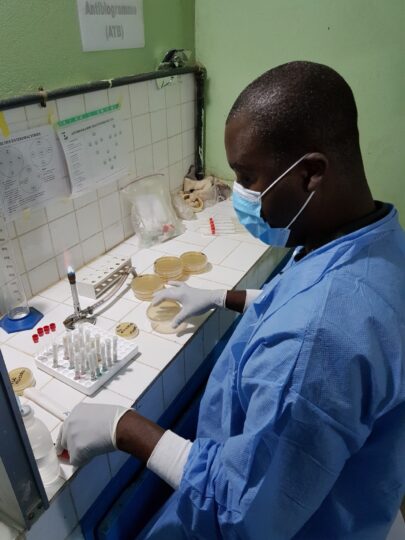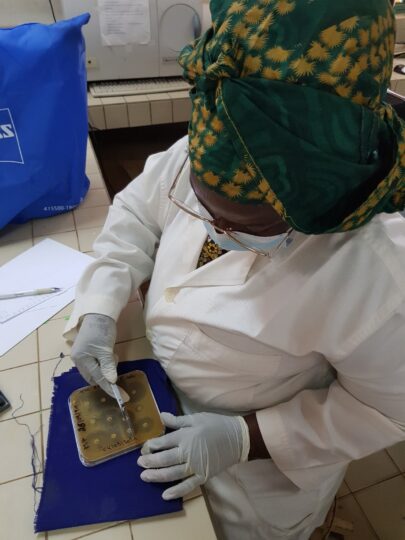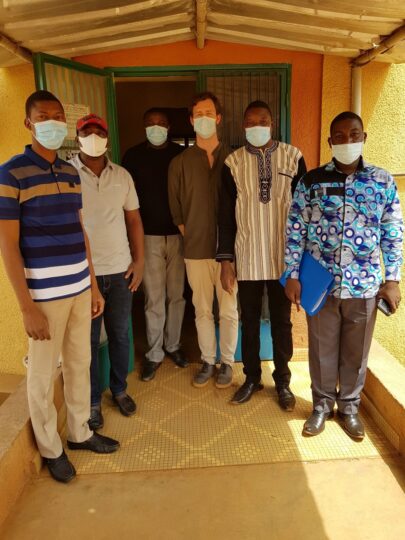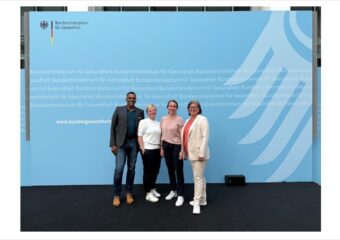Evaluation of new Bacteriological Laboratories
Site visits of project laboratories for the new established bacteriological routine diagnostics.
During a six weeks-stay (30 January – 15 March 2021), Paul Pitzinger from RKI (P3) visited the partner sites in both Côte d’Ivoire and Burkina Faso. One aim of the visit was to support our partners in SARS-CoV-2 diagnostics in particular technical support in serological SARS-CoV-2 analyses.
Another aim was the evaluation of previously implemented quality control methods for bacteriological diagnostics, especially in the new established laboratories at the rural sites of both countries.
At the Centre Hospitalier Universitaire (CHU) in Bouaké, the current standard of practice works well and the use of the automated blood culture system has increased since its implementation in the course of ARGOS to enable a faster and better diagnostic of bacteriological pathogens (von Laer A, N’Guessan MA, Touré FS, et al. Implementation of Automated Blood Culture With Quality Assurance in a Resource-Limited Setting. Front Med (Lausanne). 2021;8:627513. doi: 10.3389/fmed.2021.627513).
At the bacteriological laboratory in Guiglo, in the far West of Côte d’Ivoire, the focus was set on evaluating the extent to which the quality assurance measures implemented in June 2019 are being carried out. These measures contain regular testing of reagents and antibiotic discs with reference strains, followed by appropriate counter-measurements if the results show significant deviations. The current method of external quality control is to re-test all the isolated pathogens (identification and antimicrobial resistance) for validation of the results at the CHU in Bouaké. Discrepancies are reported immediately to the laboratory in Guiglo. In case of systematic errors, experienced microbiologists from CHU support the laboratory team in Guiglo with special re-trainings on-site. At a reunion with responsible clinical staff, the lab received positive feedback, highlighting the importance of good bacteriological diagnostic for clinical decision-making. Especially the new possibility of detecting antimicrobial resistance stands out the most for the clinicians. Nevertheless, clinicians expressed the need for more practical trainings in using the results. This knowledge of the specific needs helps planning the next steps and will lead to more tailored presentation of results and possible future projects for this laboratory.
After Côte d’Ivoire Mr. Pitzinger continued directly to Burkina Faso to visit the partner institutes Centre Muraz (CM) and Centre Universitaire Hospitalier Souro Sanou (CHUSS) in Bobo-Dioulasso to follow up on bacteriological procedures at these sites. He also visited the rural laboratory in Dano, a three hours’ drive in the east of Bobo-Dioulasso, which started bacteriological operations in October 2020 with stool culture with the help of ARGOS. This initial step was very much appreciated by the local clinicians for supporting diagnostics. Before implementing this laboratory, stool samples could only be examined in Bobo-Dioulasso however, the time-consuming transportation affected the sample quality, which in turn often led to unusable and unreliable results. Due to the new bacteriological capacities results can now be obtained in a timely manner and can thus support clinicians in fast diagnostical decisions. The next step for this new laboratory would be to extend bacteriological analyses to urine culture as highly demanded by local clinicians. The plan for implementation of urine culture and a possible study for the investigation of resistant urinary pathogens at Dano is currently being drafted by the help of CHUSS.
Further meetings with the responsible directors of the health centers in Guiglo and Dano were organized to discuss on how to continue and stabilize operations at both laboratories beyond the project period. It is crucial to ensure that all the efforts put in these unique rural bacteriological laboratories will stay for the benefit of better treatment and patients’ health in these often-neglected areas of Western Africa.
Date: June 2021





